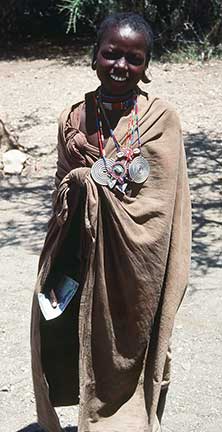Donnez-Moi Quelque Chose (Give Me Something)
 I was not prepared for the number of people in Africa demanding handouts. In every village, crowds of children would run towards the truck waving and cheering, obviously delighted to see us. But not for the pleasure of our company!
I was not prepared for the number of people in Africa demanding handouts. In every village, crowds of children would run towards the truck waving and cheering, obviously delighted to see us. But not for the pleasure of our company!
"Donnez-moi un cadeaux."
"Donnez-moi un stylo."
"Donnez-moi une cigarette." (Even little children.)
"Donnez-moi une bon-bon."
"Donnez-moi un montre."
It wasn't just the kids. Adults, too. Some waved; others thrust out their hands. There was an interesting combination of gestures that started as a wave and ended with the hand whipping around to a palm-up position.
Many people pantomimed what they wanted. They rubbed their tummies, acted out drinking from a bottle, opened and closed their tattered shirts, showed us their bare feet, even jumped around kicking an imaginary soccer ball. All this as the truck rolled by at top speed (up to 40 mph). I couldn't help wondering how often they got a response. Did people in other vehicles passing through just throw things out the windows? It seemed absurd, and a little sad.
Dennis met a friendly and articulate teenager in Goma, Zaire, who showed him around and spent some time with him while I was on duty guarding the truck. The boy was the son of a local native missionary. He attended a good school, and was well groomed and respectful. After some time, he asked for a gift. Dennis stopped and said, "Listen, in my country when we have guests, we're interested in talking to them because we enjoy showing them our country and learning about theirs. If you are just spending time with me in order to get something for free, we should part company right now."
The boy reassured Dennis that his motives were pure and they enjoyed some more conversation. But after awhile, he asked if Dennis might have a book that could help him practice his English. Dennis said he'd look in the truck to see if there was a book that everyone had already read.
After a brief pause, the boy added, "Make sure it's a big book."
P.S. Six years later, in 1994, Goma became the site of a massive refugee camp as thousands of people fled the Rwandan genocide. On July 13 - 14 of that year, ten to twelve thousand people an hour poured into Goma. Nearly a million refugees suffered due to an acute lack of food, water, and shelter. Thousands died when cholera broke out. We thought about that teenager and his book when we read what was happening there.
One morning we walked ahead of the truck to get some exercise. There were dozens of uniformed children of all ages walking the same direction, and I struck up a conversation with one of them in French. He was learning English and was thrilled to practice. He was delighted that we could understand him. He told us that he and the others left home at 5:00 a.m. and walked 12 kilometers to school, which was in session from 8:00 to 1:30. They then walked home and worked for the rest of the day. His physics exercise book was a beautiful example of neat and careful schoolwork. He had a great sense of humor and I liked him.
He asked if he could correspond with us. "Of course," I answered. "You write in English and I'll write back in French." He found a scrap of paper and we exchanged addresses. He wanted assurance that I would write. Then he said, "Perhaps you could send me some books to improve my English."
"Perhaps," I responded.
"And an atlas. My friend got an atlas from someone in America."
"Maybe," I said.
The conversation continued along other lines for awhile, then he said, "And could you send me a bicycle so I don't have to walk to school every day."
"I don't think so," I said, a bit surprised.
"If I come to America, may I visit you?" he queried.
"Sure," I answered, "but it's a very long way to Alaska."
"Will you send me an airplane ticket? I would like to come live with you and go to school in America."
Admittedly, the prospects for an illustrious academic future in Zaire are a bit limited. I admire his dedication. But it seemed this was asking a bit much from people he'd met just 15 minutes earlier.
In Kenya, a young group of children stoned us when we didn't meet their demands for candy, pens, and so forth.
A guide in a game park asked for my Goretex jacket. I told him no, it was the only jacket I had for the trip. He said he needed it and I could always buy another.
Niceties such as "please" and "thank you" were unknown. The trick was to take the money and run. Old and crippled beggars to whom we contributed coins would count them and look away in disdain, making it clear they considered us cheap. We heard that one American had given $100 tips to every African who helped him in any way. People seemed to expect the same from us and were disappointed when we didn't come through. Although we had brought some small gifts, we soon ceased giving them, not wanting to contribute to Africans viewing us as an inexhaustible source of wealth and feeling entitled to "their" share.
After returning home, however, I sought out a good Christian orphanage in Malawi, Kondanani Village, to support, and later the Sandra Lee Centre in Swaziland. Due to AIDS and other health issues, more than 15,000,000 African children have been orphaned. Families and neighbors help as many children as they can, but their means are limited. Good orphanages give at least some little ones a chance at life. African orphans are among the poorest of the poor in the world. I can't help them all, but I can do something. I encourage everyone to find a well-run charity and support it. I highly recommend Cross International, with their mission to serve the poorest of the poor internationally by channeling aid through existing churches or church-based ministries, cost-effectively helping the poor physically, while advancing the Gospel of Jesus Christ. We should not take blessings for granted. It is a great blessing to be financially able to contribute to the support of babies and children growing up with no parents to support and protect them. Even a contribution equal to the price of a candy bar a day can make a huge difference for the poorest of the poor.
Go on to Hiking Mt. Kenya
Source: www.SusanCAnthony.com, ©Susan C. Anthony
